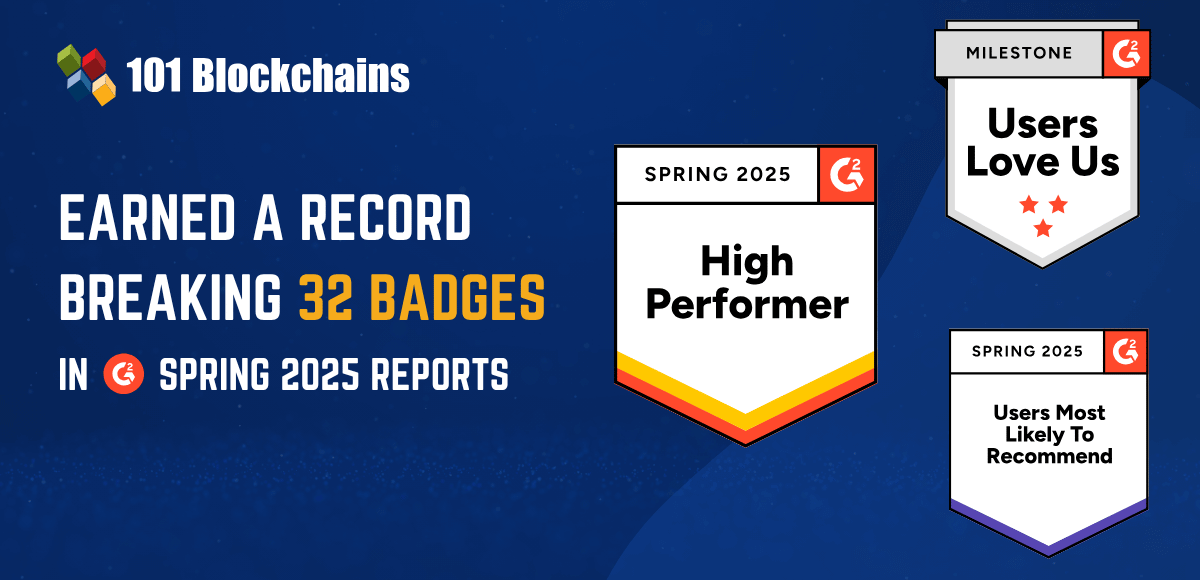Learn how blockchain truly works, master key definitions, and uncover what makes smart contracts so "smart." Dive into the fundamentals, gain valuable insights, and start your blockchain journey today!

- News & Updates
101 Blockchains
- on March 21, 2021
New York State Testing IBM Covid-19 Blockchain App
The State of New York has achieved a significant milestone in the implementation of a blockchain health certificate application. In partnership with IBM, the State of New York is aiming to redefine the perception of blockchain health certificate apps. The IBM COVID-19 blockchain app, known as Excelsior Pass, would exhibit proof regarding COVID-19 vaccination or negative test results.
The Excelsior Pass COVID-19 app can help in confirming vaccination for COVID-19. It will also help in verifying the testing information of individuals with the assurance of highly confidential and secure data transfer. The initiative by the State of New York and IBM can introduce promising opportunities for reopening businesses and venues faster. Participants will get a QR code with the Excelsior Pass, just like a mobile airline boarding pass. Venues can scan the QR code to confirm the health status of an individual, thereby ensuring safety.
The first trial of the Excelsior Pass was implemented at a Brooklyn Nets basketball game in New York City at the Barclays Center. The second and most recent pilot test of Excelsior Pass was implemented at a New York Rangers ice hockey game. With a venue like the Madison Square Garden as the testing site, the pilot test exhibits credibility. The results of the pilot test will help in developing user experience before submission to Apple and Google app stores.
IBM COVID-19 Blockchain App – An Enterprise Blockchain Application
The IBM COVID-19 blockchain app is one of the most renowned enterprise blockchain applications currently under development. COVID-19 health certificates are inevitable requirements for ensuring that businesses could resume normal operations. In the case of the majority of health certificate applications, data communication transcends directly between an individual and the health provider.
Blockchain technology plays a crucial role by ensuring proper verification of the fact that the health provider has issued the certificate. It also helps in verifying that the certificate is issued to the concerned person without any concerns of copying. As a result, health certificate applications can serve as verifiable credentials for COVID-19 vaccination and negative test results.
The Governor of New York, Andrew Cuomo, stated that “We are slowly starting to reopen the valves on various faucets of our economy. At the same time, we have to vigilant of the possibilities of another outbreak of the virus. So, we are imposing certain guidelines to ensure that people attending larger gatherings have a vaccination or tested negative for COVID”.
He also added, “The Excelsior Pass IBM COVID-19 blockchain app will serve as a critical aspect in secure and streamlined delivery of information to sites and venues. Subsequently, it can speed up the process of reopening businesses and help us resume the new normal faster”.
According to the General Manager of IBM Public and Federal Market, Steve LaFleche, the Excelsior Pass can set a national example of using new approaches for safely rejuvenating economies while safeguarding public health.
He said, “By testing a tool with the desired flexibility and accessibility for participants alongside achieving privacy and security of personal data as the core element, we are definitely making progress in the right direction”.
Also Read: Use Cases and Applications of Blockchain in Healthcare
Other Blockchain-based Health Initiatives by IBM
The Excelsior Pass is just another milestone for IBM in designing blockchain-based health applications. The IBM Digital Health Pass is a promising example of an IBM COVID-19 blockchain app. Introduced first in October last year, the IBM Digital Health Pass solution helps in verifying the status of employee health in different workplaces.
In addition, the ID2020 launched the Good Health Pass Collaborative in early 2021 for supporting interoperability across different health credential solutions. The Good Health Pass Collaborative aims to capitalize on the continuously growing popularity of COVID-19 credential solutions in the existing market. Some of the notable members of the ID2020 include the International Chamber of Commerce and the Airports Council International.
Many airlines are presently working on a trial of various health credential initiatives. For example, Emirates Airlines is working on adopting GE Digital and the TrustOne app by TE-FOOD. On the other hand, Singapore Airlines, British Airways, alongside other airlines, are carrying out pilot tests of the Travel Pass platform by IATA. Simultaneously, Air France is exploring possibilities of health credential initiative with the ICC AOKpass.
The example of Excelsior Pass is not the only IBM COVID-19 blockchain app that has gained attention in recent times. Apart from the Digital Health Pass initiative, IBM has also engaged in collaboration with Moderna to explore the use of AI, blockchain, and other technologies for revolutionizing COVID-19 vaccine distribution. Moderna, a leading pharmaceutical company, is working on a blockchain pilot for offering vaccine traceability. The new blockchain initiative would help healthcare providers and governments in verifying the existing status of particular vaccine batches. Most important of all, the traceability of vaccine distribution would span throughout the supply chain, beginning from manufacturers to destination sites.
The ventures of IBM in blockchain-based health initiatives receive adequate support of its in-house enterprise blockchain offerings. For example, the IBM Food Trust helps in supply chain traceability in a different sector with similar results as the IBM COVID-19 blockchain app. Previously, IBM had also engaged in an FDA pharmaceutical pilot test for launching a blockchain consortium. A blockchain consortium known as the Pharmaceutical Utility Network (PhUN) includes notable names such as KPMG, Walmart, and Merck.
The VP and Managing Director of North America Commercial Operations for Moderna, Michael Mullette, expressed positive interest in working with IBM. According to him, working with IBM for applying digital innovations can develop connections among individuals, organizations, and governments for improving the confidence of people in COVID-19 vaccines.
Important Points of the Excelsior Pass IBM COVID-19 Blockchain App
The Excelsior Pass is also an exemplar of IBM’s leadership in fostering responsible stewardship of valuable data of clients and technology. The Excelsior Pass complies with the high ethical standards of IBM, guidelines for technology development in response to COVID-19, and the Principles of Trust and Transparency established by IBM.
The IBM COVID-19 blockchain app leverages the open standards of blockchain technology, thereby enabling easier interoperability with other solutions. The open architecture of Excelsior Pass can also enable other states to join the initiative and understand the applications of blockchain in healthcare. So, it can help in building a seamless and secure ecosystem for businesses, individuals, and governments nationwide for an effective transition.
Most important of all, IBM offers support for the inclusive and equitable application of health passes and accessibility of the COVID-19 vaccine. Therefore, it is easier to configure the IBM COVID-19 blockchain app for ensuring convenience and accessibility. User feedback for different states could help in including support for multiple languages. In addition, states could also work towards ensuring that users can have the option for reverting to a paper-based pass.
Also Read: Blockchain In Pharma: Will Pharmaceutical Industry Evolve?
What’s Next with IBM COVID-19 Blockchain App?
The new IBM COVID-19 blockchain app could introduce new benchmarks in combating COVID-19 and resuming the ‘new normal.’ The new app could help residents of New York in sharing their health status voluntarily according to their convenience. With the assurance of robust privacy protection, Excelsior Pass can ensure better safeguards for user information. Furthermore, the ground-up approach for developing Excelsior Pass offers better credibility.
In addition, the support of notable names such as Moderna could foster opportunities for resuming normal operations of businesses. Initiatives by tech giants such as Tata Consultancy Services in blockchain health apps can also make a mark. In the long run, applications of blockchain in healthcare can drive better efficiency of infrastructure for improving supply chain management for COVID-19 vaccination.




